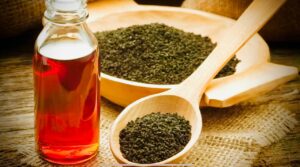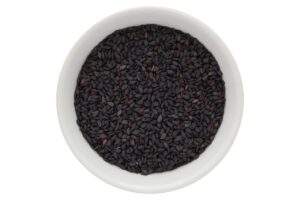Blackseed is a natural marvel and highly valued for centuries for its medicinal properties. The health Benefits of Black Seed are immense. This tiny seed packs a powerful punch when it comes to wellness. From supporting immune function to promoting digestive health and even aiding in weight management, black seed offers a plethora of advantages. These are backed by scientific research and historical use. Here I will highlight the rich history, scientific evidence, and practical applications of this ancient remedy. I will also discuss its potential to enhance health and vitality in today’s modern world.
Basic Facts About Black Seed
Before we move on to the health benefits of Black Seed, let us explore some interesting facts about this magic seed. The scientific name of Black Seed is Nigella Sativa. It belongs to the botanical family of Ranunculaceae. It is an annual flowering plant native to parts of Africa, South West Asia, and the Mediterranean.
 For hundreds of years, people used to regard black seed as a medicinal plant because of its multiple health benefits. It has been used in various forms of alternative medicine including Ayurveda, the ancient Indian literature of medicine. More interestingly, the health benefits of black seed have been described in various religions such as Islam and Christianity. In the religious book of Islam, the Prophet Muhammad was quoted as saying, “Hold on to use the black seeds, because it can heal every disease except the death.” Even the Holy Bible mentioned it as a curative black seed. In ancient days, the Persians used to use it to cure fever, wounds, skin diseases, fungus, parasites, and worms, as well as against bites and stings of poisonous animals.
For hundreds of years, people used to regard black seed as a medicinal plant because of its multiple health benefits. It has been used in various forms of alternative medicine including Ayurveda, the ancient Indian literature of medicine. More interestingly, the health benefits of black seed have been described in various religions such as Islam and Christianity. In the religious book of Islam, the Prophet Muhammad was quoted as saying, “Hold on to use the black seeds, because it can heal every disease except the death.” Even the Holy Bible mentioned it as a curative black seed. In ancient days, the Persians used to use it to cure fever, wounds, skin diseases, fungus, parasites, and worms, as well as against bites and stings of poisonous animals.
Top 10 Health Benefits of Black Seed
In contemporary research, there have been extensive studies on the health benefits of black seed. While some findings are rooted in traditional wisdom, many are supported by strong scientific evidence. In this discussion, I will focus on the top 10 benefits of black seed that have been established by research studies, highlighting its remarkable potential for enhancing well-being.
Black Seed and Immune Support:
Black seeds have been used for a long time to treat illnesses like fever, coughs, chest congestion, and bronchitis. Research suggests that black seeds can boost our immune system by making certain immune cells more active and supporting cells that fight infections. They might also help with allergies like hay fever.
Anti-inflammatory Properties of Black Seed:
Black seed oil contains a special compound called thymoquinone, which has been found to have anti-inflammatory properties. This means it can calm down inflammation, which is when parts of our body get swollen and irritated. So, using black seed oil might be helpful if you have conditions where there is too much inflammation, like arthritis or asthma.
Black Seed and Digestive Health:
Black seed is great for curing problems like indigestion and bloating. It makes the digestive system work better. When we eat, our body makes special juices called digestive enzymes to help break down our food. Black seed can help our body make more of these enzymes, so it digests our food properly. This means less tummy troubles like feeling too full or having gas. So, if you want to keep your tummy happy, adding black seed to your diet might be a good idea!
Black Seed and Heart Health:
Studies have shown that black seed may lower bad cholesterol levels and help control high blood pressure, which are two big factors for heart problems. Plus, it has antioxidants that protect our heart from damage caused by harmful molecules called free radicals. Adding black seed to your daily diet could be a smart move for keeping your heart in tip-top shape and reducing the risk of heart disease. So, give your heart some love by adding a sprinkle of black seed to your meals!
Black Seed and Respiratory Support:
Black seed has been used for ages to help with respiratory issues like asthma and bronchitis. This tiny seed contains special compounds that can soothe inflammation in our airways, making it easier to breathe. Plus, its antimicrobial properties can help fight off pesky germs that cause respiratory infections. Whether you are dealing with a nagging cough or seasonal allergies, black seed might just be the natural remedy you need to keep your respiratory system happy and healthy. So, next time you’re feeling stuffed up or wheezy, consider giving the black seed a try!
Black Seed and Skin Health:
Black seed is packed with vitamins, minerals, and healthy fats. It is like a nourishing treat for your skin. Whether you are dealing with acne or eczema, or just want a radiant glow, black seed can help you significantly. Its anti-inflammatory properties can help calm redness and irritation, while its antimicrobial abilities fight off acne-causing bacteria. Plus, its moisturizing effects can leave your skin feeling soft and supple. Whether you use it topically or ingest it as oil or supplement, black seed can be a game-changer for your skincare routine. So, if you are looking for a natural way to achieve clear, glowing skin, look no further than black seed.
Weight Management with Black Seed:
Black seed might just be the secret ingredient in your weight management journey! This tiny seed has the nutrients and compounds that can help support a healthy metabolism and curb cravings. Research suggests that black seed may help boost metabolism, making it easier for your body to burn calories and shed excess weight. Plus, its fiber content can help you feel fuller for longer, reducing the urge to snack between meals. Incorporating black seed into your diet, whether sprinkled on salads, added to smoothies, or taken as a supplement, could be a simple yet effective way to support your weight loss goals. So, if you’re looking for a natural way to slim down and feel your best, consider giving black seed a try!
Black Seed and Brain Health:
Black seed is a powerhouse when it comes to brain health! It is full of nutrients and special compounds. Also, it has the potential to support cognitive function and protect brain cells from damage. Research suggests that black seed contains antioxidants and anti-inflammatory properties that may help reduce oxidative stress in the brain. It relates to cognitive decline and neurodegenerative diseases like Alzheimer’s. Additionally, some studies indicate that black seed may improve memory and overall cognitive function. Whether you are looking to boost your brainpower or protect against age-related decline, incorporating black seed into your diet could be a simple yet effective way to support your brain health.
support cognitive function and protect brain cells from damage. Research suggests that black seed contains antioxidants and anti-inflammatory properties that may help reduce oxidative stress in the brain. It relates to cognitive decline and neurodegenerative diseases like Alzheimer’s. Additionally, some studies indicate that black seed may improve memory and overall cognitive function. Whether you are looking to boost your brainpower or protect against age-related decline, incorporating black seed into your diet could be a simple yet effective way to support your brain health.
Antimicrobial Effects of Black Seed:
Black seed exhibits antimicrobial properties against a range of bacteria, viruses, and fungi, making it effective in fighting infections and promoting overall health.
Pain Relief with Black Seed:
Black seed’s analgesic properties can provide relief from various types of pain. It can help alleviate various types of pain, from headaches to menstrual cramps and muscle soreness. Research suggests that black seed contains substances that can block pain signals in the body, providing relief without the side effects associated with traditional pain medications. Whether used topically as oil or taken internally as a supplement, black seed offers a natural alternative for those seeking relief from discomfort.
Best ways to get the optimum health benefits of black seed
The main active compound in black seeds is thymoquinone. It is found the most in the oil from the seeds. This is the best way to take it. You can take the oil by itself or mix it with honey. You can mix one teaspoon of honey with the right amount of black seed oil.
Please remember that some research studies have highlighted shreds of evidence of black seed side effects. Hence, before you start taking these supplements, it is important to talk to a doctor to make sure they are right for you. Also, make sure you are using good-quality, pure black seed oil from a trusted place. The better the quality, the better the health benefits of black seed you will get.
FAQs
What are the health benefits of black seed to men?
Apart from the common benefits for all, there are some additional health benefits of black seed for men. In fact, several research studies support the traditional beliefs about black seed benefits for males.
Prostate Health: Black seed contains compounds that may support prostate health and reduce the risk of conditions like prostate enlargement and cancer.
Sexual Health: Some studies suggest that black seed may have aphrodisiac properties and could help improve libido and sexual performance in men.
Testosterone Levels: Research indicates that black seed may have a positive impact on testosterone levels, potentially enhancing muscle growth, energy levels, and overall vitality in men.
How much black seeds should I take daily?
The recommended daily dosage of black seed can vary depending on factors such as your age, overall health, and the specific health benefits you are seeking. However, general guidelines suggest taking 1-2 teaspoons of black seed oil per day or 1-3 grams of whole black seeds.
It is essential to start with a lower dose and gradually increase it to assess how your body responds. Additionally, consulting with a healthcare professional before starting any new supplement is advisable, especially if you have any underlying health conditions or are taking medications.
Remember to choose high-quality, pure black seed products from reputable sources to ensure safety and effectiveness.
Does black seed increase testosterone?
There are numerous research and studies on black seed benefits for males. Such studies suggest that black se
ed may have a positive impact on testosterone levels. Some studies have shown that black seed supplementation can lead to increases in testosterone levels in both animals and humans. However, more research can help us to fully understand the effects of black seed on testosterone levels and its potential benefits for overall health and wellness. As with any supplement, it is essential to consult with a healthcare professional before starting black seed supplementation, especially if you have any underlying health conditions or are taking medications. This will help you avoid the risk of any black seed oil related side effects.
What are the side effects of black seed?

While black seed is generally considered safe for most people when used in moderate amounts, some individuals may experience black seed side effects. These can include:
Allergic reactions: Some people may be allergic to black seed or its oil, leading to symptoms such as itching, rash, or difficulty breathing.
Gastrointestinal issues: In some cases, black seed oil may cause digestive upset, such as nausea, stomach pain, or diarrhoea.
Blood sugar effects: Black seed may lower blood sugar levels, so individuals with diabetes or hypoglycaemia should monitor their blood sugar levels closely when using black seed supplements.
Bleeding disorders: Black seed may have anticoagulant properties, so individuals with bleeding disorders or those taking blood-thinning medications should use black seed with caution.
Pregnancy and breastfeeding: Pregnant or breastfeeding women should avoid black seed due to the lack of safety data regarding its use during these times.
It’s essential to consult with a healthcare professional before starting black seed supplementation, especially if you have any underlying health conditions or are taking medications. Additionally, it is crucial to choose high-quality, pure black seed products from reputable sources to minimize the risk of adverse effects.
How long does black seed take to work?
Multiple factors such as an individual’s overall health, any specific health issue, and the method of intake (whole seeds, oil, or supplements) can affect the effectiveness of black seed.
Some people may notice benefits from black seed relatively quickly, within a few days or weeks of starting supplementation. For example, individuals with respiratory issues may experience improvements relatively soon after incorporating black seed into their routine.
However, for other health concerns such as weight management or immune support, it may take longer to see noticeable results. It can often take several weeks to months of consistent use.
It is essential to be patient and give black seed sufficient time to work. Also, it is important to ensure that you are using it correctly and at the appropriate dosage. It will help to avoid any risk of black seed oil side effects. As always, a healthcare professional can guide the proper use of black seed for your specific health needs.
What happens when you eat black seeds every day?
Eating black seeds every day may offer several potential health benefits due to their rich nutritional profile and various bioactive compounds. When you consume regularly, you may experience some health benefits of black seed. Such benefits include enhanced immunity, a healthy digestive system, a healthy heart, better respiratory support, healthy skin, a healthy brain, and so on. It can also help in weight control by boosting metabolism and controlling appetite.
What does black seed oil do to the female body?
There are separate studies on black seed benefits for males and females. One of the key health benefits of black seed for females is to maintain hormonal balance. Some studies suggest that black seed oil may help regulate hormonal levels in women. It could be beneficial for conditions like menstrual irregularities or menopausal symptoms.
Who should not take black seed?
While most people can safely use black seed and black seed oil in moderation, individuals with certain conditions should use them with caution.
Pregnant and breastfeeding women: Black seed may stimulate uterine contractions, so pregnant women should avoid it to prevent potential complications. Also, we have limited safety data regarding its use during breastfeeding.
People with bleeding disorders: Black seed may have anticoagulant properties. It could increase the risk of bleeding. So individuals with bleeding disorders or those taking blood-thinning medications should use black seed with caution.
Allergy: Some individuals may be allergic to black seed or its oil. It can lead to allergic reactions such as itching, rash, or difficulty breathing. If you have known allergies to seeds or plants in the Ranunculaceae family, it is best to avoid black seed.
Diabetes: Black seed may lower blood sugar levels. Hence, individuals with diabetes or hypoglycaemia should monitor their blood sugar levels closely when using black seed supplements.
Surgery: Due to its potential effects on blood sugar levels and blood clotting, it is advisable to stop using black seed at least a few weeks before scheduled surgery. It will reduce the risk of bleeding or other complications during or after the procedure.
It is essential to consult with a healthcare professional before starting black seed supplementation. This is extremely important if you have any underlying health conditions or are taking medications. Additionally, it is crucial to choose high-quality, pure black seed products from reputable sources. It will minimize the risk of adverse effects.

Pingback: Homemade Remedy For Sore Throat: Honey And Lemon - Opal Page